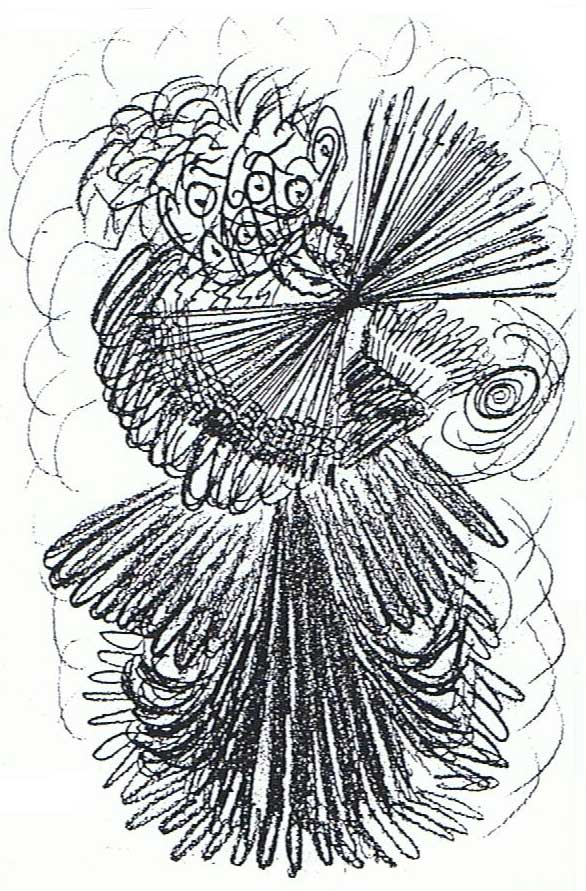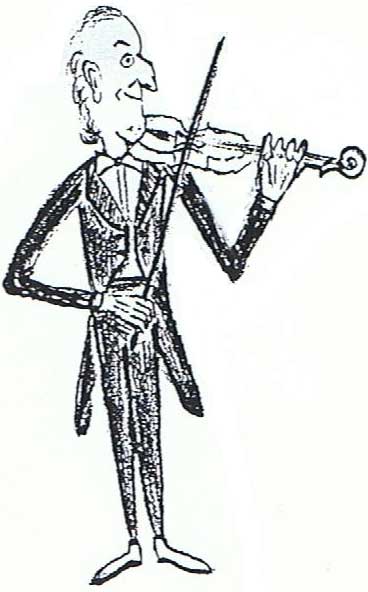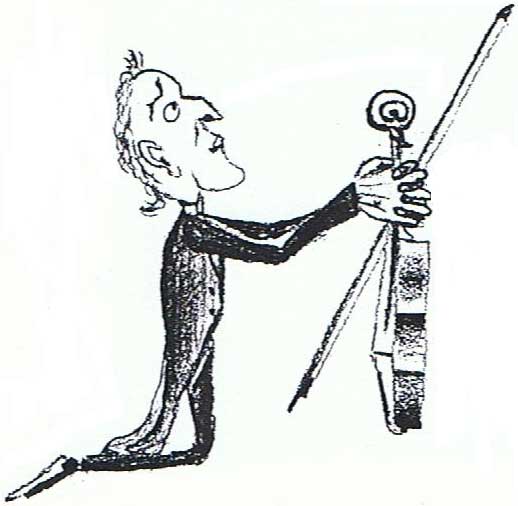About the inner pressure during musical performances
and their preparations
Personal reflections and drawings by Ingolf Turban
“Actually, I prepared myself very well and was looking forward to the concert. Then I got on the podium, it was a beautiful, courageous and sonorous start – until I suddenly somehow lost the thread and my nerves too. My ice-cold fingers got lost in some passages, I got faster and faster, couldn’t find my footing any more, lost my stable footing too, as if the boards that mean a whole world to me were suddenly tilting… the more I tried to control myself, the worse a hitherto unimaginable energy sucked me out of the music I love so much after all.
What am I doing wrong…?”

It is not uncommon for me to hear such phrases during my work with a wide variety of students, especially at master classes, when people actually hardly know each other yet enjoy the gift of enormous trust. Evident is the pressure of suffering, but also the undertone of self-accusation during such open conversations. On closer examination, I notice the following almost in unison: The main complaint is the perceived loss of control. Interesting that the students usually come to this cardinal point on their own! The only question is from which angle this topic is approached. I dare to say that behind the buzzword “loss of control” rather the opposite is hidden: All too often a “too much” of control has been trained, and this supposed, well-intentioned “self-control” then dominates us in stressful situations rather than us controlling it. In concrete terms, this can already mean in the classroom: If I were to sharply rebuke a student that this or that passage “once again has not been intonated properly”, I would establish a problem consciousness in my counterpart which, depending on the character trait, would initially translate into a bad mood, self-accusation, unbalanced posture and even physical pressure. If “nevertheless” an improvement in intonation succeeds, it is more like the short-term success of a military perseverance exercise. But the sacrifice is high: the clean tone is “fought for”, the inner tension already practised at home. The dilemma now is that this way of working masquerades as “indispensable”: as misguided “diligence” consisting of endless repetitions of always the same “problem spots”, without which no success could supposedly be achieved. Typical of this is an almost ritualistic pattern of behaviour: one first takes a spirited run-up at an unreduced pace, reaches the “problem spot”, fails at it and gets annoyed. The process is aborted. Our “problem family tree” has already branched out: firstly, we have broken our promise to ourselves to really play through the piece for once. Secondly, we have given proof to ourselves at full speed that we cannot “master” this and that passage. Thirdly, we swear to ourselves that we will use all our strength at the next attempt to get over the hurdles.
Fourthly, if physical exertion comes into play, cramping follows almost immediately. If there is nevertheless short-term success, fifthly we have committed a blinding self-deception and sixthly we have superficially calmed our “work conscience”…
Under such conditions, how could we expect to “stop” for the first time on the podium and wish for a concentration that we have cut ourselves unspeakably beforehand “thanks to” permanent and arbitrary interruptions? If we simplify our brain as a data storage device that is hungry for what we feed it, we should pay very close attention to which “food” we should put in front of it and which we would rather not. If the “chunks” are too big at first, we will “chop them up” until we can take them in. And as it is also true with food: whoever eats slowly enjoys and digests better! And observe more closely what was eaten, perhaps even how it was eaten!

At this point I would like to prevent a threatening misunderstanding: the preceding example from conventional teaching on the subject of intonation is not intended to reprimand teachers, but to show, by means of one of thousands of details, how enormously sensitive the line is on which we are moving here. Of course, a precise examination of intonation, for example, will always be a very important part of string, wind and singing lessons. The “how” is decisive here: if we succeed in listening “with a common ear”, so to speak, in questioning together how this or that which is done is projected into the room, which practice method has this or that effect, typologically adapted, then we will succeed.
which typologically adapted practice method has this or that effect, then, without formulating it explicitly, a growing relationship of trust can be established: not only with the teachers, but – above all! – to one’s own activity. Then mistakes do not become “enemies” but exciting challenges to be accepted in a relaxed way. In this mental stage, a kind of “alter ego” can build up, whose distanced viewpoint decisively strengthens one’s own observation status. An almost amused attitude can become the wonderful consequence, which takes the unnecessary rigour out of serious work and helps us to mirror it. It is the self-reflective
It is the self-reflective work that awakens the “inner pedagogue” in us,
It is the occasional pause, the complete silence in between, that enables us to go into ourselves in order to sense highly individual ways of finding solutions. And this is where the “public test” comes in: Can I allow myself to do on the podium what I have allowed myself to do in silence at home? How exactly do I experience the podium, what does my breathing do when I appear, how do I feel my feet, can I merely “endure” silence in front of the assembled people or do I even welcome it as an almost shared concentration even before the first note sounds? Do I still experience my excitement as a panic-tinged moment that I thought I had to fight against until now, or is it not much more a means of transporting my currently increased energy, which I may now finally get rid of, yes: give away? I would prefer to compare the preparatory “practising” with the process of calmly and accurately packing my suitcase for a long journey. All the utensils are carefully considered and associate a secure future. In contrast to the travel theme, however, I now leave my perfectly packed suitcase at home and find myself on the podium – completely without a suitcase! It is a symbol for the liberation from the previously meticulous and loving control and for the orientation towards radical openness, spontaneity and emotional permeability.  Whoever has experienced what it means to give up one’s inner “high security wing” in public, of all places, knows a thing or two about the infinite expanse and freedom that one is able to give as a result.
Whoever has experienced what it means to give up one’s inner “high security wing” in public, of all places, knows a thing or two about the infinite expanse and freedom that one is able to give as a result.
Interestingly enough, even experiences of partial inadequacies
of partial inadequacies are reduced to themselves and no longer bore general
holes in the once emaciated or however encoded self-awareness.
or however encoded. In this way, the much-invoked pressure on the podium can be stripped of its damaging and constricting effect, and even more: it can mutate into the driving force of a barely imagined overall performance in which we as performers retain our centre or even explore and find it properly for the first time. “I actually played better than in any rehearsal before – funny, because this time I didn’t invest as much in practising as usual before….”
These are then the most beautiful and regularly uttered sentences that stick in my mind and of course make not only me happy! People who speak like this are a little more aware of themselves than perhaps they used to be and can continue to work in a correspondingly relaxed way with this newly gained approach.
continue to work. Last but not least, I don’t want to miss saying what is very important to me when you have experienced and gone through enormous steps and transformations together: It is a kind of deepest gratitude that sets in and goes hand in hand with too-satisfaction. Grateful for energies from which peace is nourished.
Educational Footnote
“If a man may only when he should, but never can when he wants to,
then he does not like when he has to.
But if he may when he will, then he may also when he ought, and then he can also when he must.
Those who should be able must want to be allowed.”
(Source unknown)